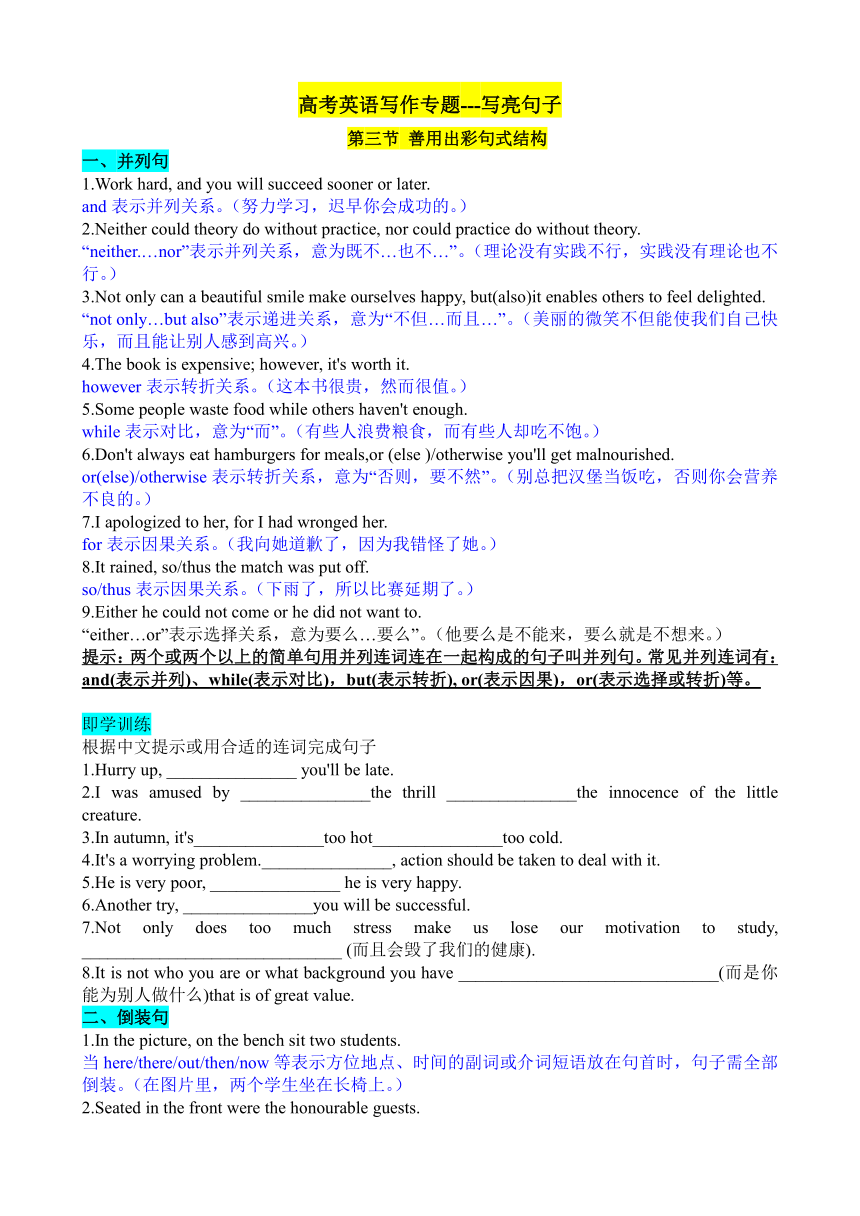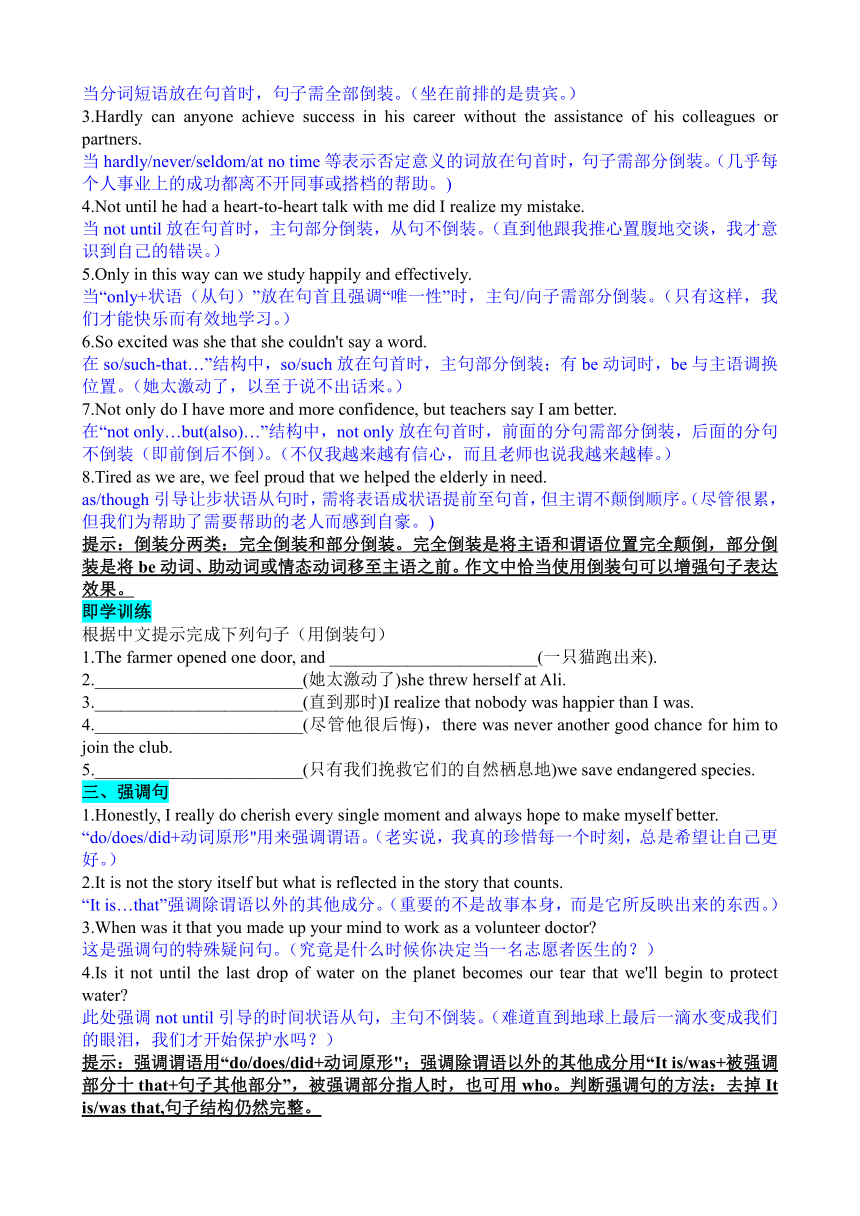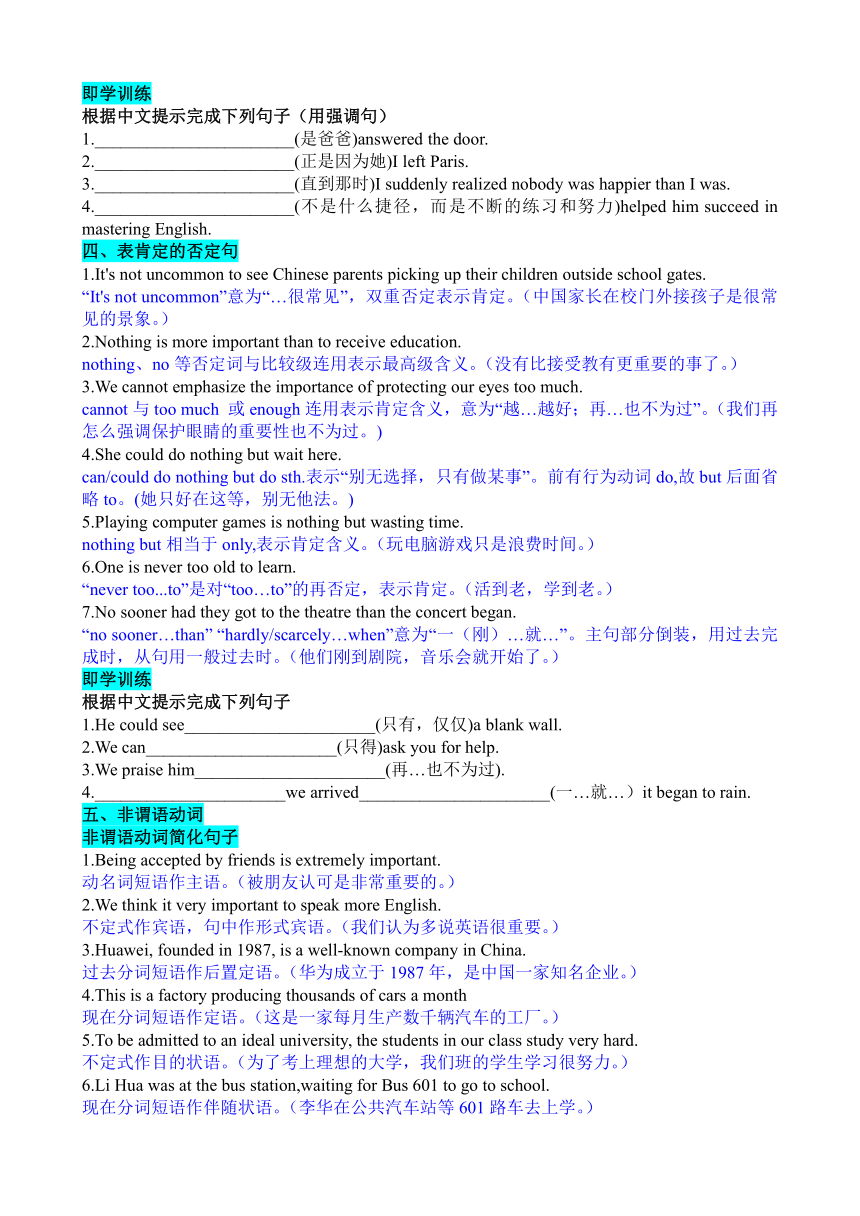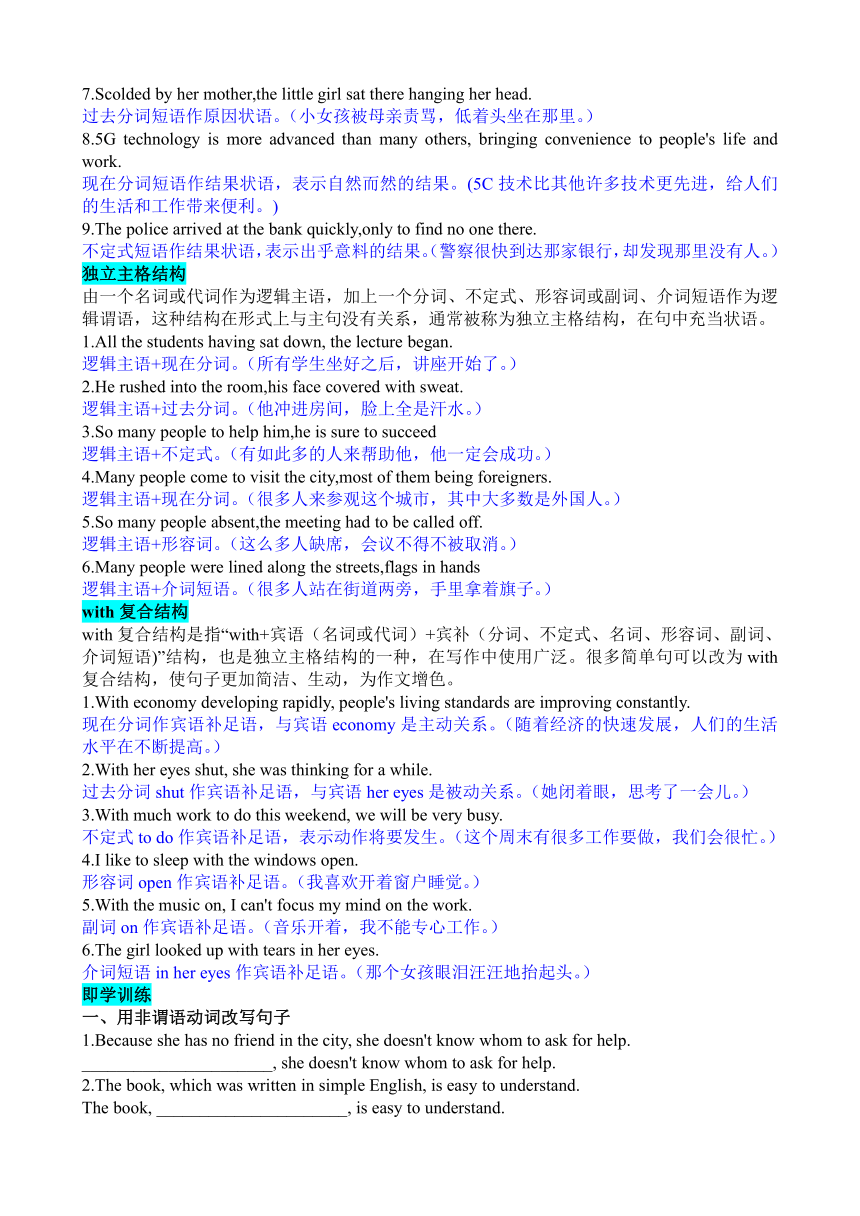2024届高考英语写作专题 写亮句子 善用出彩句式结构 导学案(含答案)
文档属性
| 名称 | 2024届高考英语写作专题 写亮句子 善用出彩句式结构 导学案(含答案) |  | |
| 格式 | docx | ||
| 文件大小 | 32.7KB | ||
| 资源类型 | 教案 | ||
| 版本资源 | 通用版 | ||
| 科目 | 英语 | ||
| 更新时间 | 2024-04-18 11:10:36 | ||
图片预览




文档简介
高考英语写作专题---写亮句子
第三节 善用出彩句式结构
一、并列句
1.Work hard, and you will succeed sooner or later.
and表示并列关系。(努力学习,迟早你会成功的。)
2.Neither could theory do without practice, nor could practice do without theory.
“neither.…nor”表示并列关系,意为既不…也不…”。(理论没有实践不行,实践没有理论也不行。)
3.Not only can a beautiful smile make ourselves happy, but(also)it enables others to feel delighted.
“not only…but also”表示递进关系,意为“不但…而且…”。(美丽的微笑不但能使我们自己快乐,而且能让别人感到高兴。)
4.The book is expensive; however, it's worth it.
however表示转折关系。(这本书很贵,然而很值。)
5.Some people waste food while others haven't enough.
while表示对比,意为“而”。(有些人浪费粮食,而有些人却吃不饱。)
6.Don't always eat hamburgers for meals,or (else )/otherwise you'll get malnourished.
or(else)/otherwise表示转折关系,意为“否则,要不然”。(别总把汉堡当饭吃,否则你会营养不良的。)
7.I apologized to her, for I had wronged her.
for表示因果关系。(我向她道歉了,因为我错怪了她。)
8.It rained, so/thus the match was put off.
so/thus表示因果关系。(下雨了,所以比赛延期了。)
9.Either he could not come or he did not want to.
“either…or”表示选择关系,意为要么…要么”。(他要么是不能来,要么就是不想来。)
提示:两个或两个以上的简单句用并列连词连在一起构成的句子叫并列句。常见并列连词有:and(表示并列)、while(表示对比),but(表示转折), or(表示因果),or(表示选择或转折)等。
即学训练
根据中文提示或用合适的连词完成句子
1.Hurry up, _______________ you'll be late.
2.I was amused by _______________the thrill _______________the innocence of the little creature.
3.In autumn, it's_______________too hot_______________too cold.
4.It's a worrying problem._______________, action should be taken to deal with it.
5.He is very poor, _______________ he is very happy.
6.Another try, _______________you will be successful.
7.Not only does too much stress make us lose our motivation to study, ______________________________ (而且会毁了我们的健康).
8.It is not who you are or what background you have ______________________________(而是你能为别人做什么)that is of great value.
二、倒装句
1.In the picture, on the bench sit two students.
当here/there/out/then/now等表示方位地点、时间的副词或介词短语放在句首时,句子需全部倒装。(在图片里,两个学生坐在长椅上。)
2.Seated in the front were the honourable guests.
当分词短语放在句首时,句子需全部倒装。(坐在前排的是贵宾。)
3.Hardly can anyone achieve success in his career without the assistance of his colleagues or partners.
当hardly/never/seldom/at no time等表示否定意义的词放在句首时,句子需部分倒装。(几乎每个人事业上的成功都离不开同事或搭档的帮助。)
4.Not until he had a heart-to-heart talk with me did I realize my mistake.
当not until放在句首时,主句部分倒装,从句不倒装。(直到他跟我推心置腹地交谈,我才意识到自己的错误。)
5.Only in this way can we study happily and effectively.
当“only+状语(从句)”放在句首且强调“唯一性”时,主句/向子需部分倒装。(只有这样,我们才能快乐而有效地学习。)
6.So excited was she that she couldn't say a word.
在so/such-that…”结构中,so/such放在句首时,主句部分倒装;有be动词时,be与主语调换位置。(她太激动了,以至于说不出话来。)
7.Not only do I have more and more confidence, but teachers say I am better.
在“not only…but(also)…”结构中,not only放在句首时,前面的分句需部分倒装,后面的分句不倒装(即前倒后不倒)。(不仅我越来越有信心,而且老师也说我越来越棒。)
8.Tired as we are, we feel proud that we helped the elderly in need.
as/though引导让步状语从句时,需将表语成状语提前至句首,但主谓不颠倒顺序。(尽管很累,但我们为帮助了需要帮助的老人而感到自豪。)
提示:倒装分两类:完全倒装和部分倒装。完全倒装是将主语和谓语位置完全颠倒,部分倒装是将be动词、助动词或情态动词移至主语之前。作文中恰当使用倒装句可以增强句子表达效果。
即学训练
根据中文提示完成下列句子(用倒装句)
1.The farmer opened one door, and ________________________(一只猫跑出来).
2.________________________(她太激动了)she threw herself at Ali.
3.________________________(直到那时)I realize that nobody was happier than I was.
4.________________________(尽管他很后悔),there was never another good chance for him to join the club.
5.________________________(只有我们挽救它们的自然栖息地)we save endangered species.
三、强调句
1.Honestly, I really do cherish every single moment and always hope to make myself better.
“do/does/did+动词原形"用来强调谓语。(老实说,我真的珍惜每一个时刻,总是希望让自己更好。)
2.It is not the story itself but what is reflected in the story that counts.
“It is…that”强调除谓语以外的其他成分。(重要的不是故事本身,而是它所反映出来的东西。)
3.When was it that you made up your mind to work as a volunteer doctor
这是强调句的特殊疑问句。(究竟是什么时候你决定当一名志愿者医生的?)
4.Is it not until the last drop of water on the planet becomes our tear that we'll begin to protect water
此处强调not until引导的时间状语从句,主句不倒装。(难道直到地球上最后一滴水变成我们的眼泪,我们才开始保护水吗?)
提示:强调谓语用“do/does/did+动词原形";强调除谓语以外的其他成分用“It is/was+被强调部分十that+句子其他部分”,被强调部分指人时,也可用who。判断强调句的方法:去掉It is/was that,句子结构仍然完整。
即学训练
根据中文提示完成下列句子(用强调句)
1._______________________(是爸爸)answered the door.
2._______________________(正是因为她)I left Paris.
3._______________________(直到那时)I suddenly realized nobody was happier than I was.
4._______________________(不是什么捷径,而是不断的练习和努力)helped him succeed in mastering English.
四、表肯定的否定句
1.It's not uncommon to see Chinese parents picking up their children outside school gates.
“It's not uncommon”意为“…很常见”,双重否定表示肯定。(中国家长在校门外接孩子是很常见的景象。)
2.Nothing is more important than to receive education.
nothing、no等否定词与比较级连用表示最高级含义。(没有比接受教有更重要的事了。)
3.We cannot emphasize the importance of protecting our eyes too much.
cannot与too much 或enough连用表示肯定含义,意为“越…越好;再…也不为过”。(我们再怎么强调保护眼睛的重要性也不为过。)
4.She could do nothing but wait here.
can/could do nothing but do sth.表示“别无选择,只有做某事”。前有行为动词do,故but后面省略to。(她只好在这等,别无他法。)
5.Playing computer games is nothing but wasting time.
nothing but相当于only,表示肯定含义。(玩电脑游戏只是浪费时间。)
6.One is never too old to learn.
“never too...to”是对“too…to”的再否定,表示肯定。(活到老,学到老。)
7.No sooner had they got to the theatre than the concert began.
“no sooner…than” “hardly/scarcely…when”意为“一(刚)…就…”。主句部分倒装,用过去完成时,从句用一般过去时。(他们刚到剧院,音乐会就开始了。)
即学训练
根据中文提示完成下列句子
1.He could see______________________(只有,仅仅)a blank wall.
2.We can______________________(只得)ask you for help.
3.We praise him______________________(再…也不为过).
4.______________________we arrived______________________(一…就…)it began to rain.
五、非谓语动词
非谓语动词简化句子
1.Being accepted by friends is extremely important.
动名词短语作主语。(被朋友认可是非常重要的。)
2.We think it very important to speak more English.
不定式作宾语,句中作形式宾语。(我们认为多说英语很重要。)
3.Huawei, founded in 1987, is a well-known company in China.
过去分词短语作后置定语。(华为成立于1987年,是中国一家知名企业。)
4.This is a factory producing thousands of cars a month
现在分词短语作定语。(这是一家每月生产数千辆汽车的工厂。)
5.To be admitted to an ideal university, the students in our class study very hard.
不定式作目的状语。(为了考上理想的大学,我们班的学生学习很努力。)
6.Li Hua was at the bus station,waiting for Bus 601 to go to school.
现在分词短语作伴随状语。(李华在公共汽车站等601路车去上学。)
7.Scolded by her mother,the little girl sat there hanging her head.
过去分词短语作原因状语。(小女孩被母亲责骂,低着头坐在那里。)
8.5G technology is more advanced than many others, bringing convenience to people's life and work.
现在分词短语作结果状语,表示自然而然的结果。(5C技术比其他许多技术更先进,给人们的生活和工作带来便利。)
9.The police arrived at the bank quickly,only to find no one there.
不定式短语作结果状语,表示出乎意料的结果。(警察很快到达那家银行,却发现那里没有人。)
独立主格结构
由一个名词或代词作为逻辑主语,加上一个分词、不定式、形容词或副词、介词短语作为逻辑谓语,这种结构在形式上与主句没有关系,通常被称为独立主格结构,在句中充当状语。
1.All the students having sat down, the lecture began.
逻辑主语+现在分词。(所有学生坐好之后,讲座开始了。)
2.He rushed into the room,his face covered with sweat.
逻辑主语+过去分词。(他冲进房间,脸上全是汗水。)
3.So many people to help him,he is sure to succeed
逻辑主语+不定式。(有如此多的人来帮助他,他一定会成功。)
4.Many people come to visit the city,most of them being foreigners.
逻辑主语+现在分词。(很多人来参观这个城市,其中大多数是外国人。)
5.So many people absent,the meeting had to be called off.
逻辑主语+形容词。(这么多人缺席,会议不得不被取消。)
6.Many people were lined along the streets,flags in hands
逻辑主语+介词短语。(很多人站在街道两旁,手里拿着旗子。)
with复合结构
with复合结构是指“with+宾语(名词或代词)+宾补(分词、不定式、名词、形容词、副词、介词短语)”结构,也是独立主格结构的一种,在写作中使用广泛。很多简单句可以改为with复合结构,使句子更加简洁、生动,为作文增色。
1.With economy developing rapidly, people's living standards are improving constantly.
现在分词作宾语补足语,与宾语economy是主动关系。(随着经济的快速发展,人们的生活水平在不断提高。)
2.With her eyes shut, she was thinking for a while.
过去分词shut作宾语补足语,与宾语her eyes是被动关系。(她闭着眼,思考了一会儿。)
3.With much work to do this weekend, we will be very busy.
不定式to do作宾语补足语,表示动作将要发生。(这个周末有很多工作要做,我们会很忙。)
4.I like to sleep with the windows open.
形容词open作宾语补足语。(我喜欢开着窗户睡觉。)
5.With the music on, I can't focus my mind on the work.
副词on作宾语补足语。(音乐开着,我不能专心工作。)
6.The girl looked up with tears in her eyes.
介词短语in her eyes作宾语补足语。(那个女孩眼泪汪汪地抬起头。)
即学训练
一、用非谓语动词改写句子
1.Because she has no friend in the city, she doesn't know whom to ask for help.
______________________, she doesn't know whom to ask for help.
2.The book, which was written in simple English, is easy to understand.
The book, ______________________, is easy to understand.
3.It is high time we took part in some activities. We want to make ourselves healthier.
It is high time we took part in some activities ______________________.
4.We ate inside the hut and sat round the fire.
We ate inside the hut ______________________.
5.The picture which is hanging on the wall was painted by my teacher.
The picture ______________________ was painted by my teacher.
6.When we are faced with difficulties,we need friends to give us comfort and help.
______________________, we need friends to give us comfort and help.
7.When I saw a car running towards her, I reached my hand out and pulled her back.
______________________, I reached my hand out and pulled her back.
二、用独立主格结构完成下列句子
1.______________________(如果时间允许的话),we will go for an outing tomorrow.
2.______________________(由于眼镜摔坏了),she couldn't see the words on the blackboard.
3.______________________(由于约翰不在),Harry had to do the work.
4.She appeared in front of us, ______________________(脸上闪耀着快乐的光芒).
5.______________________(由于我为她带路),the foreign girl was very grateful.
六、被动句
1.Every student is expected to take part in the activity.
期待每个学生都参与到这项活动中来。
2.Everyone is supposed to do his share of contribution.
每个人都应该做一点贡献。
3.Therefore, I strongly propose that some effective measures should be taken to stop such behaviour.
因此,我强烈建议采取有效的措施来制止类似行为。
4.A man must not be judged by his appearance, just as the ocean cannot be measured in gallons.
人不可貌相,海水不可斗量。
5.I am not sure whether the college students can get employed after graduation.
我不确定这些大学生毕业后能否找到工作。
6.Life is to be lived and enjoyed, not to be wasted or complained about.
生活需要用心体会和细心品味,而不是抱怨和虚度光阴。
提示:在书面语中,被动语态因其突出强调所陈述的事实而被广泛使用。在不需要提及或出于礼貌避免提及动作执行者时,也常用被动语态。
即学训练
根据中文提示完成下列句子(用被动句)
1.___________________(当说出这些话时),the crown was placed on her head.
2.___________________(人们被告知)that washing dirt off our body can keep us healthy.
3.Fortunately, ___________________(找到方法)to settle the water problem.
七、虚拟句
1.If I were you, I should apply for the post.
此处是写引导的虚拟条件句,表示与现在事实相反的假设。(如果我是你的话,我会申请这个职位。)
2.Had you come here earlier yesterday, you would have seen her.
省略if后的句子要倒装,即把had(表示与过去事实相反)、were(表示与现在或将来事实相反)、should(表示与将来事实相反)提至从句句首。(如果你昨天早点来,你会看到她。)
3.I suggest that you (should)spend more time and put your heart into study.
在表示命今(order),建议(suggest, advise),要求(require, request)等动词后接的名词性从句中,谓语用 “(should+)动词原形”。(我建议你多花时间专心学习。)
4.I wish more and more students could go to their ideal colleges.
wish后的从句谓请用did/were(表示现在的愿望)、had done(表示过去的愿望)、would/should/could do(表示将来的愿望)。(我希望越来越多的学生能进入他们理想中的大学。)
5.I will treat my students kindly, as if they were my kids.
引导的从句表示不可能或不真实的情况时,从句用虚拟语气。(我会善待我的学生,就像他们是我的孩子一样。)
6.Without you, I couldn't have made such great progress.
without, but for, otherwise等引导含蓄条件句时,相当于引导的虚拟条件句,主句用虚拟语气。(没有你,我不可能取得这么大的进步。)
7.It's high time that parents should put down smartphones and communicate more with the old.
句型:It’s high time that sb did/should do sth,句中should不能省略。(现在该是父母们放下智能手机,多与老人交流的时候了。)
8.I have caught a bad cold lately and I'd rather I stayed at home instead of going anywhere.
would rather后的从句谓语用did/were(表示现在/将来的愿望)、had done(对已发生情况表示遗憾或后悔)。(最近我得了重感冒,我宁愿待在家里,哪儿也不去。)
9.It is urgent that some measures (should)be taken to cope with the problem.
在句型It is necessary/important/urgent that.(should)do”中,从句用虚拟语气。(迫切需要采取一些措施来解决这个问题。)
提示:虚拟语气丰富了语言的交际功能。在使用时要注意动作发生的时间,再确定其对应的谓语形式。
即学训练
根据中文提示完成下列句子
1.I think I would not have lived any longer ___________________(如果我没有遇见他们).
2.I felt ______________________________________(好像有一只拳头在击打着我的心脏).
3.I insist ______________________________________(他要么把这本书换成新的,要么把钱还给我).
4.But for you, my dear teacher, ___________________(我不会实现我的梦想).
5.On this special occasion,______________________________________(我多么希望能和你倾心交谈).
6.Without your instruction, ___________________(我不可能在比赛中获得第一名)。
八、无灵主语句
1.Your name slipped my mind.
我记不起你的名字了
2.Anxiety tore her into pieces.
地焦虑不安,崩遗了。
3.His help will ensure my success.
他肯帮忙,我一定会成功。
4.Ten years of hard work changed her greatly
十年的辛勤劳作使她大大地变样了。
5.Words failed him. He wept as he embraced his old father
他拥抱年迈的父亲时哭得说不出话来。
6.Shanghai witnessed the birth of the Chinese Communist Party.
中国共产党在上海成立。
7.A brilliant idea suddenly crossed his mind.
他突然想到了一个绝妙的主意。
8.Good news brought cheers to her eyes.
她听到好消息,喜上眉梢。
提示:在英语中,无灵主语句由无灵主语和有灵谓语构成,赋予无生命事物人的情感、行为、品质等特征,属于拟人表达。无灵主语句使句子生动形象,更有表现力。
即学训练
根据中文提示完成下列句子
1.________________________(过去的几十年见证了)earth-shaking changes in China.
2.________________________(我突然产生了一个可怕的想法)---had I locked the door
3.When she heard the good news, ________________________(兴奋不已).
4.Once she got over her shyness, I found ________________________(她灿烂的笑容好像点亮了整个屋子).
参考答案:
第三节善用出彩句式结构
并列句
1.or/otherwise
2.both;and
3.neither;nor
4.Therefore
5.but
6.and
7.but also it can ruin our health
8.but what you can do for others
倒装句
1.out ran a cat
2.So thrilled/excited was she that
3.Not until then did
4.Regretful as/though he was
5.Only if we save their natural habitats will
强调句
1.It was Dad who/that
2.It was because of her that
3.It was not until then that
4.It is not any shortcut but constant practice and hard work that
表肯定的否定句
1.nothing but
2.do nothing but
3.can't;too much/highly
4.Hardly /Scarcely had;when
非谓语动词
一、1.Having no friend in the city
2.written in simple English
3.to make ourselves healthier
4.sitting round the fire
5.hanging on the wall
6.Faced with difficulties
7.Seeing a car running towards her
二、l.Time permitting
2.Her glasses broken
3.John being away
4.her face bright with joy
5.With me leading the way for her
被动句
1.As these words were spoken
2.People are/have been told
3.ways are found
虚拟句
1.if I had not met them
2.as if a fist were pounding at my heart
3.he either replace the book with a new one or give my money back
4.I wouldn't have realized my dream
5.how I wish I could have a heart-to-heart talk with you
6.I could not have won first place in the competition
无灵主语句
1.The past several decades has witnessed
2.A terrible thought suddenly struck me
3.a wide excitement took hold of her
4.her bright smile lit up the whole room
第三节 善用出彩句式结构
一、并列句
1.Work hard, and you will succeed sooner or later.
and表示并列关系。(努力学习,迟早你会成功的。)
2.Neither could theory do without practice, nor could practice do without theory.
“neither.…nor”表示并列关系,意为既不…也不…”。(理论没有实践不行,实践没有理论也不行。)
3.Not only can a beautiful smile make ourselves happy, but(also)it enables others to feel delighted.
“not only…but also”表示递进关系,意为“不但…而且…”。(美丽的微笑不但能使我们自己快乐,而且能让别人感到高兴。)
4.The book is expensive; however, it's worth it.
however表示转折关系。(这本书很贵,然而很值。)
5.Some people waste food while others haven't enough.
while表示对比,意为“而”。(有些人浪费粮食,而有些人却吃不饱。)
6.Don't always eat hamburgers for meals,or (else )/otherwise you'll get malnourished.
or(else)/otherwise表示转折关系,意为“否则,要不然”。(别总把汉堡当饭吃,否则你会营养不良的。)
7.I apologized to her, for I had wronged her.
for表示因果关系。(我向她道歉了,因为我错怪了她。)
8.It rained, so/thus the match was put off.
so/thus表示因果关系。(下雨了,所以比赛延期了。)
9.Either he could not come or he did not want to.
“either…or”表示选择关系,意为要么…要么”。(他要么是不能来,要么就是不想来。)
提示:两个或两个以上的简单句用并列连词连在一起构成的句子叫并列句。常见并列连词有:and(表示并列)、while(表示对比),but(表示转折), or(表示因果),or(表示选择或转折)等。
即学训练
根据中文提示或用合适的连词完成句子
1.Hurry up, _______________ you'll be late.
2.I was amused by _______________the thrill _______________the innocence of the little creature.
3.In autumn, it's_______________too hot_______________too cold.
4.It's a worrying problem._______________, action should be taken to deal with it.
5.He is very poor, _______________ he is very happy.
6.Another try, _______________you will be successful.
7.Not only does too much stress make us lose our motivation to study, ______________________________ (而且会毁了我们的健康).
8.It is not who you are or what background you have ______________________________(而是你能为别人做什么)that is of great value.
二、倒装句
1.In the picture, on the bench sit two students.
当here/there/out/then/now等表示方位地点、时间的副词或介词短语放在句首时,句子需全部倒装。(在图片里,两个学生坐在长椅上。)
2.Seated in the front were the honourable guests.
当分词短语放在句首时,句子需全部倒装。(坐在前排的是贵宾。)
3.Hardly can anyone achieve success in his career without the assistance of his colleagues or partners.
当hardly/never/seldom/at no time等表示否定意义的词放在句首时,句子需部分倒装。(几乎每个人事业上的成功都离不开同事或搭档的帮助。)
4.Not until he had a heart-to-heart talk with me did I realize my mistake.
当not until放在句首时,主句部分倒装,从句不倒装。(直到他跟我推心置腹地交谈,我才意识到自己的错误。)
5.Only in this way can we study happily and effectively.
当“only+状语(从句)”放在句首且强调“唯一性”时,主句/向子需部分倒装。(只有这样,我们才能快乐而有效地学习。)
6.So excited was she that she couldn't say a word.
在so/such-that…”结构中,so/such放在句首时,主句部分倒装;有be动词时,be与主语调换位置。(她太激动了,以至于说不出话来。)
7.Not only do I have more and more confidence, but teachers say I am better.
在“not only…but(also)…”结构中,not only放在句首时,前面的分句需部分倒装,后面的分句不倒装(即前倒后不倒)。(不仅我越来越有信心,而且老师也说我越来越棒。)
8.Tired as we are, we feel proud that we helped the elderly in need.
as/though引导让步状语从句时,需将表语成状语提前至句首,但主谓不颠倒顺序。(尽管很累,但我们为帮助了需要帮助的老人而感到自豪。)
提示:倒装分两类:完全倒装和部分倒装。完全倒装是将主语和谓语位置完全颠倒,部分倒装是将be动词、助动词或情态动词移至主语之前。作文中恰当使用倒装句可以增强句子表达效果。
即学训练
根据中文提示完成下列句子(用倒装句)
1.The farmer opened one door, and ________________________(一只猫跑出来).
2.________________________(她太激动了)she threw herself at Ali.
3.________________________(直到那时)I realize that nobody was happier than I was.
4.________________________(尽管他很后悔),there was never another good chance for him to join the club.
5.________________________(只有我们挽救它们的自然栖息地)we save endangered species.
三、强调句
1.Honestly, I really do cherish every single moment and always hope to make myself better.
“do/does/did+动词原形"用来强调谓语。(老实说,我真的珍惜每一个时刻,总是希望让自己更好。)
2.It is not the story itself but what is reflected in the story that counts.
“It is…that”强调除谓语以外的其他成分。(重要的不是故事本身,而是它所反映出来的东西。)
3.When was it that you made up your mind to work as a volunteer doctor
这是强调句的特殊疑问句。(究竟是什么时候你决定当一名志愿者医生的?)
4.Is it not until the last drop of water on the planet becomes our tear that we'll begin to protect water
此处强调not until引导的时间状语从句,主句不倒装。(难道直到地球上最后一滴水变成我们的眼泪,我们才开始保护水吗?)
提示:强调谓语用“do/does/did+动词原形";强调除谓语以外的其他成分用“It is/was+被强调部分十that+句子其他部分”,被强调部分指人时,也可用who。判断强调句的方法:去掉It is/was that,句子结构仍然完整。
即学训练
根据中文提示完成下列句子(用强调句)
1._______________________(是爸爸)answered the door.
2._______________________(正是因为她)I left Paris.
3._______________________(直到那时)I suddenly realized nobody was happier than I was.
4._______________________(不是什么捷径,而是不断的练习和努力)helped him succeed in mastering English.
四、表肯定的否定句
1.It's not uncommon to see Chinese parents picking up their children outside school gates.
“It's not uncommon”意为“…很常见”,双重否定表示肯定。(中国家长在校门外接孩子是很常见的景象。)
2.Nothing is more important than to receive education.
nothing、no等否定词与比较级连用表示最高级含义。(没有比接受教有更重要的事了。)
3.We cannot emphasize the importance of protecting our eyes too much.
cannot与too much 或enough连用表示肯定含义,意为“越…越好;再…也不为过”。(我们再怎么强调保护眼睛的重要性也不为过。)
4.She could do nothing but wait here.
can/could do nothing but do sth.表示“别无选择,只有做某事”。前有行为动词do,故but后面省略to。(她只好在这等,别无他法。)
5.Playing computer games is nothing but wasting time.
nothing but相当于only,表示肯定含义。(玩电脑游戏只是浪费时间。)
6.One is never too old to learn.
“never too...to”是对“too…to”的再否定,表示肯定。(活到老,学到老。)
7.No sooner had they got to the theatre than the concert began.
“no sooner…than” “hardly/scarcely…when”意为“一(刚)…就…”。主句部分倒装,用过去完成时,从句用一般过去时。(他们刚到剧院,音乐会就开始了。)
即学训练
根据中文提示完成下列句子
1.He could see______________________(只有,仅仅)a blank wall.
2.We can______________________(只得)ask you for help.
3.We praise him______________________(再…也不为过).
4.______________________we arrived______________________(一…就…)it began to rain.
五、非谓语动词
非谓语动词简化句子
1.Being accepted by friends is extremely important.
动名词短语作主语。(被朋友认可是非常重要的。)
2.We think it very important to speak more English.
不定式作宾语,句中作形式宾语。(我们认为多说英语很重要。)
3.Huawei, founded in 1987, is a well-known company in China.
过去分词短语作后置定语。(华为成立于1987年,是中国一家知名企业。)
4.This is a factory producing thousands of cars a month
现在分词短语作定语。(这是一家每月生产数千辆汽车的工厂。)
5.To be admitted to an ideal university, the students in our class study very hard.
不定式作目的状语。(为了考上理想的大学,我们班的学生学习很努力。)
6.Li Hua was at the bus station,waiting for Bus 601 to go to school.
现在分词短语作伴随状语。(李华在公共汽车站等601路车去上学。)
7.Scolded by her mother,the little girl sat there hanging her head.
过去分词短语作原因状语。(小女孩被母亲责骂,低着头坐在那里。)
8.5G technology is more advanced than many others, bringing convenience to people's life and work.
现在分词短语作结果状语,表示自然而然的结果。(5C技术比其他许多技术更先进,给人们的生活和工作带来便利。)
9.The police arrived at the bank quickly,only to find no one there.
不定式短语作结果状语,表示出乎意料的结果。(警察很快到达那家银行,却发现那里没有人。)
独立主格结构
由一个名词或代词作为逻辑主语,加上一个分词、不定式、形容词或副词、介词短语作为逻辑谓语,这种结构在形式上与主句没有关系,通常被称为独立主格结构,在句中充当状语。
1.All the students having sat down, the lecture began.
逻辑主语+现在分词。(所有学生坐好之后,讲座开始了。)
2.He rushed into the room,his face covered with sweat.
逻辑主语+过去分词。(他冲进房间,脸上全是汗水。)
3.So many people to help him,he is sure to succeed
逻辑主语+不定式。(有如此多的人来帮助他,他一定会成功。)
4.Many people come to visit the city,most of them being foreigners.
逻辑主语+现在分词。(很多人来参观这个城市,其中大多数是外国人。)
5.So many people absent,the meeting had to be called off.
逻辑主语+形容词。(这么多人缺席,会议不得不被取消。)
6.Many people were lined along the streets,flags in hands
逻辑主语+介词短语。(很多人站在街道两旁,手里拿着旗子。)
with复合结构
with复合结构是指“with+宾语(名词或代词)+宾补(分词、不定式、名词、形容词、副词、介词短语)”结构,也是独立主格结构的一种,在写作中使用广泛。很多简单句可以改为with复合结构,使句子更加简洁、生动,为作文增色。
1.With economy developing rapidly, people's living standards are improving constantly.
现在分词作宾语补足语,与宾语economy是主动关系。(随着经济的快速发展,人们的生活水平在不断提高。)
2.With her eyes shut, she was thinking for a while.
过去分词shut作宾语补足语,与宾语her eyes是被动关系。(她闭着眼,思考了一会儿。)
3.With much work to do this weekend, we will be very busy.
不定式to do作宾语补足语,表示动作将要发生。(这个周末有很多工作要做,我们会很忙。)
4.I like to sleep with the windows open.
形容词open作宾语补足语。(我喜欢开着窗户睡觉。)
5.With the music on, I can't focus my mind on the work.
副词on作宾语补足语。(音乐开着,我不能专心工作。)
6.The girl looked up with tears in her eyes.
介词短语in her eyes作宾语补足语。(那个女孩眼泪汪汪地抬起头。)
即学训练
一、用非谓语动词改写句子
1.Because she has no friend in the city, she doesn't know whom to ask for help.
______________________, she doesn't know whom to ask for help.
2.The book, which was written in simple English, is easy to understand.
The book, ______________________, is easy to understand.
3.It is high time we took part in some activities. We want to make ourselves healthier.
It is high time we took part in some activities ______________________.
4.We ate inside the hut and sat round the fire.
We ate inside the hut ______________________.
5.The picture which is hanging on the wall was painted by my teacher.
The picture ______________________ was painted by my teacher.
6.When we are faced with difficulties,we need friends to give us comfort and help.
______________________, we need friends to give us comfort and help.
7.When I saw a car running towards her, I reached my hand out and pulled her back.
______________________, I reached my hand out and pulled her back.
二、用独立主格结构完成下列句子
1.______________________(如果时间允许的话),we will go for an outing tomorrow.
2.______________________(由于眼镜摔坏了),she couldn't see the words on the blackboard.
3.______________________(由于约翰不在),Harry had to do the work.
4.She appeared in front of us, ______________________(脸上闪耀着快乐的光芒).
5.______________________(由于我为她带路),the foreign girl was very grateful.
六、被动句
1.Every student is expected to take part in the activity.
期待每个学生都参与到这项活动中来。
2.Everyone is supposed to do his share of contribution.
每个人都应该做一点贡献。
3.Therefore, I strongly propose that some effective measures should be taken to stop such behaviour.
因此,我强烈建议采取有效的措施来制止类似行为。
4.A man must not be judged by his appearance, just as the ocean cannot be measured in gallons.
人不可貌相,海水不可斗量。
5.I am not sure whether the college students can get employed after graduation.
我不确定这些大学生毕业后能否找到工作。
6.Life is to be lived and enjoyed, not to be wasted or complained about.
生活需要用心体会和细心品味,而不是抱怨和虚度光阴。
提示:在书面语中,被动语态因其突出强调所陈述的事实而被广泛使用。在不需要提及或出于礼貌避免提及动作执行者时,也常用被动语态。
即学训练
根据中文提示完成下列句子(用被动句)
1.___________________(当说出这些话时),the crown was placed on her head.
2.___________________(人们被告知)that washing dirt off our body can keep us healthy.
3.Fortunately, ___________________(找到方法)to settle the water problem.
七、虚拟句
1.If I were you, I should apply for the post.
此处是写引导的虚拟条件句,表示与现在事实相反的假设。(如果我是你的话,我会申请这个职位。)
2.Had you come here earlier yesterday, you would have seen her.
省略if后的句子要倒装,即把had(表示与过去事实相反)、were(表示与现在或将来事实相反)、should(表示与将来事实相反)提至从句句首。(如果你昨天早点来,你会看到她。)
3.I suggest that you (should)spend more time and put your heart into study.
在表示命今(order),建议(suggest, advise),要求(require, request)等动词后接的名词性从句中,谓语用 “(should+)动词原形”。(我建议你多花时间专心学习。)
4.I wish more and more students could go to their ideal colleges.
wish后的从句谓请用did/were(表示现在的愿望)、had done(表示过去的愿望)、would/should/could do(表示将来的愿望)。(我希望越来越多的学生能进入他们理想中的大学。)
5.I will treat my students kindly, as if they were my kids.
引导的从句表示不可能或不真实的情况时,从句用虚拟语气。(我会善待我的学生,就像他们是我的孩子一样。)
6.Without you, I couldn't have made such great progress.
without, but for, otherwise等引导含蓄条件句时,相当于引导的虚拟条件句,主句用虚拟语气。(没有你,我不可能取得这么大的进步。)
7.It's high time that parents should put down smartphones and communicate more with the old.
句型:It’s high time that sb did/should do sth,句中should不能省略。(现在该是父母们放下智能手机,多与老人交流的时候了。)
8.I have caught a bad cold lately and I'd rather I stayed at home instead of going anywhere.
would rather后的从句谓语用did/were(表示现在/将来的愿望)、had done(对已发生情况表示遗憾或后悔)。(最近我得了重感冒,我宁愿待在家里,哪儿也不去。)
9.It is urgent that some measures (should)be taken to cope with the problem.
在句型It is necessary/important/urgent that.(should)do”中,从句用虚拟语气。(迫切需要采取一些措施来解决这个问题。)
提示:虚拟语气丰富了语言的交际功能。在使用时要注意动作发生的时间,再确定其对应的谓语形式。
即学训练
根据中文提示完成下列句子
1.I think I would not have lived any longer ___________________(如果我没有遇见他们).
2.I felt ______________________________________(好像有一只拳头在击打着我的心脏).
3.I insist ______________________________________(他要么把这本书换成新的,要么把钱还给我).
4.But for you, my dear teacher, ___________________(我不会实现我的梦想).
5.On this special occasion,______________________________________(我多么希望能和你倾心交谈).
6.Without your instruction, ___________________(我不可能在比赛中获得第一名)。
八、无灵主语句
1.Your name slipped my mind.
我记不起你的名字了
2.Anxiety tore her into pieces.
地焦虑不安,崩遗了。
3.His help will ensure my success.
他肯帮忙,我一定会成功。
4.Ten years of hard work changed her greatly
十年的辛勤劳作使她大大地变样了。
5.Words failed him. He wept as he embraced his old father
他拥抱年迈的父亲时哭得说不出话来。
6.Shanghai witnessed the birth of the Chinese Communist Party.
中国共产党在上海成立。
7.A brilliant idea suddenly crossed his mind.
他突然想到了一个绝妙的主意。
8.Good news brought cheers to her eyes.
她听到好消息,喜上眉梢。
提示:在英语中,无灵主语句由无灵主语和有灵谓语构成,赋予无生命事物人的情感、行为、品质等特征,属于拟人表达。无灵主语句使句子生动形象,更有表现力。
即学训练
根据中文提示完成下列句子
1.________________________(过去的几十年见证了)earth-shaking changes in China.
2.________________________(我突然产生了一个可怕的想法)---had I locked the door
3.When she heard the good news, ________________________(兴奋不已).
4.Once she got over her shyness, I found ________________________(她灿烂的笑容好像点亮了整个屋子).
参考答案:
第三节善用出彩句式结构
并列句
1.or/otherwise
2.both;and
3.neither;nor
4.Therefore
5.but
6.and
7.but also it can ruin our health
8.but what you can do for others
倒装句
1.out ran a cat
2.So thrilled/excited was she that
3.Not until then did
4.Regretful as/though he was
5.Only if we save their natural habitats will
强调句
1.It was Dad who/that
2.It was because of her that
3.It was not until then that
4.It is not any shortcut but constant practice and hard work that
表肯定的否定句
1.nothing but
2.do nothing but
3.can't;too much/highly
4.Hardly /Scarcely had;when
非谓语动词
一、1.Having no friend in the city
2.written in simple English
3.to make ourselves healthier
4.sitting round the fire
5.hanging on the wall
6.Faced with difficulties
7.Seeing a car running towards her
二、l.Time permitting
2.Her glasses broken
3.John being away
4.her face bright with joy
5.With me leading the way for her
被动句
1.As these words were spoken
2.People are/have been told
3.ways are found
虚拟句
1.if I had not met them
2.as if a fist were pounding at my heart
3.he either replace the book with a new one or give my money back
4.I wouldn't have realized my dream
5.how I wish I could have a heart-to-heart talk with you
6.I could not have won first place in the competition
无灵主语句
1.The past several decades has witnessed
2.A terrible thought suddenly struck me
3.a wide excitement took hold of her
4.her bright smile lit up the whole room
